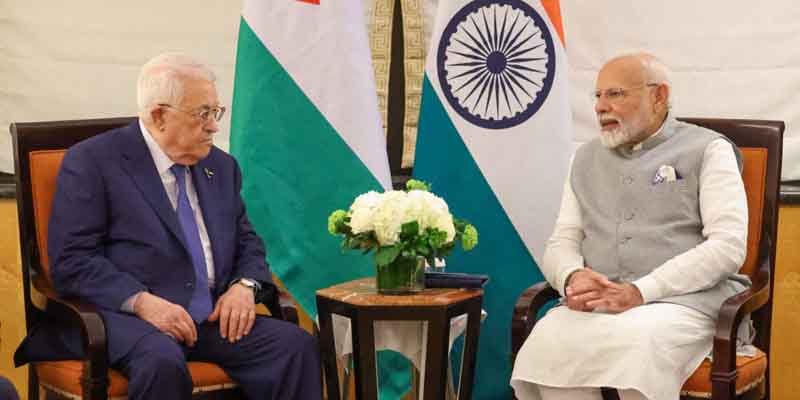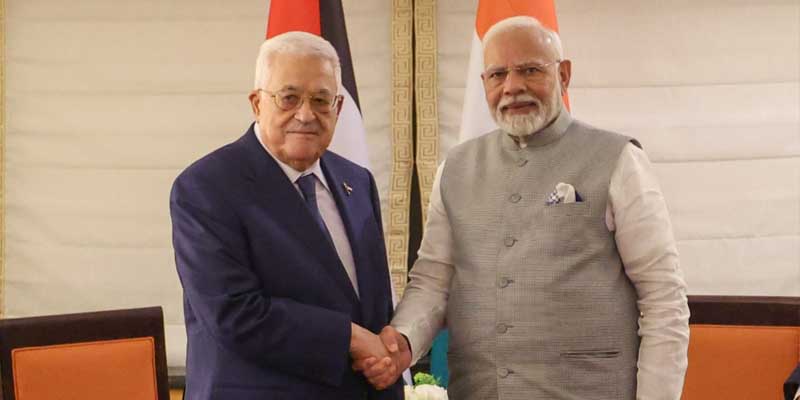- India
- Sep 24
- Kevin Savio Antony
PM Modi meets Palestinian President Mahmoud Abbas
• Prime Minister Narendra Modi met Palestinian President Mahmoud Abbas on the sidelines of the Summit of the Future in New York.
• Prime Minister reiterated India's time-tested principled position on the Israel-Palestine issue, and called for ceasefire, release of hostages and return to the path of dialogue and diplomacy.
• He stressed that only a two State solution will deliver enduring peace and stability in the region.
• Recalling that India was one of the first countries to recognise Palestine, he conveyed India’s continued support to Palestine membership of the UN.
Evolution of India-Palestine relations:
• India’s support for the Palestinian cause is an integral part of the nation’s foreign policy.
• In 1974, India became the first non-Arab State to recognise Palestine Liberation Organisation (PLO) as the sole and legitimate representative of the Palestinian people.
• In 1988, India became one of the first countries to recognise the Palestinian State.
• In 1996, India opened its Representative Office in Gaza, which was later shifted to Ramallah in 2003.
• India has always played a proactive role in garnering support for the Palestinian cause in multilateral fora.
• India has consistently supported, co-sponsored, and voted in favour of UN General Assembly Resolutions securing the right to self-determination of Palestinians, urging Israel’s compliance with legal obligations, that is ICJ’s Construction of the Wall Opinion, and its status as a non-member State at the UN.
• In 2011, India also voted in favour of Palestine becoming a full member of UNESCO.
• The NAM Ministerial Committee on Palestine was established under India’s Presidency during the VII NAM Summit in New Delhi in 1983.
• As a member of the Security Council, India continued to voice its support for a negotiated solution resulting in a sovereign, independent, viable and united State of Palestine, within secure and recognised borders, at peace beside Israel as endorsed in the relevant UNSC and UNGA Resolutions.
Developmental Cooperation
• India has provided various forms of developmental cooperation assistance to Palestine over the years. amounting to approximately $141 million.
• India has also provided a total of $39 million of budgetary support to the Palestinian Authority.
Bilateral Trade
• Trade between India and Palestine is conducted through Israel and therefore, comprehensive trade statistics are not available.
• India-Palestine annual bilateral trade volume was $67.77 million for the year 2020.
• As per the data published by the Palestinian Central Bureau of Statistics, Indian exports and imports were $67.17 million and $0.6 million, respectively.
• The Palestinian Central Bureau of Statistics reports that India has a share of 0.06 per cent of Palestine’s exports, while India ranks 13th among the importing countries for Palestine with 1.1 per cent share of total Palestine’s imports.
• Indian exports to Palestine include marble, granite, articles of stone, plaster and cement, basmati rice, raw material for making vaccines, coffee, cashew nuts, sugar, natural or cultured pearls, precious or semi-precious stones, precious metals, mineral products, base metals, machinery and mechanical appliances; vehicles and associated transport equipment, medical or surgical instruments and apparatus.
• On the other hand, Palestinian exports are mainly fresh and dried dates, virgin olive oil and its fractions and articles of base metal.
IBSA Cooperation
• India, Brazil, South Africa (IBSA) Fund has also funded four projects in Palestine worth $5 million approximately.
• These projects include Indoor Multipurpose Sports Complex in Ramallah, Phase I and Phase II of Cardio-Thoracic Unit of Palestinian Red Crescent Society’s Al Quds hospital in Gaza, Atta Habib Medical Center in Gaza; and Rehabilitation Centre for People with Mental Disabilities in Nablus.
United Nations Relief and Works Agency for Palestine Refugees in the Near East (UNRWA)
• India supports Palestine and Palestinian refugees through its contributions to UNRWA.
• India is a member of its Advisory Commission since 2020.
• India increased its annual contribution to UNRWA from $1.25 million to $5 million in 2018.
• Since 2002, India has contributed a total of $36.5 million to UNRWA till 2022-23.
Implications of the Israel-Palestine Conflict on India
The ongoing Israel-Palestine conflict has far-reaching implications for India across various sectors, including defense, energy security, and regional economic initiatives.
Here’s an analysis of these implications:
1) Defence Deals with Israel
India has developed a robust defense relationship with Israel, marked by significant defence procurement and technology cooperation.
Key points include:
• Military Supplies: Israel is the largest supplier of military equipment to India, with the defence trade valued at approximately $2.1 billion. Any escalation in the Israel-Palestine conflict could shift Israel’s focus to its immediate security needs, potentially impacting the flow of defence supplies to India.
• Technological Collaboration: Ongoing military collaborations may face disruptions as Israel prioritises its defence strategies during conflict periods, which could affect joint projects and technology transfers between the two nations.
2) Energy Security
• India’s energy security is heavily reliant on oil imports from the Middle East.
The implications of the conflict in this area are significant:
• Oil Prices: An escalation in the conflict may lead to increased oil prices, directly impacting India's economy and leading to inflationary pressures. Disruptions in oil supplies can have a ripple effect on various sectors within India.
• Geopolitical Dynamics: If regional powers like Saudi Arabia and Iran become more involved in the conflict, it may disrupt the stability of energy supply chains, further jeopardising India’s energy security and economic stability.
3) Impact on the India-Middle East-Europe Economic Corridor (IMEC)
The India-Middle East-Europe Economic Corridor (IMEC) is a critical infrastructure project aimed at enhancing connectivity and trade between India, the Middle East, and Europe.
The conflict could impact:
• Regional Stability: The conflict may destabilise the Middle East, which is strategically vital for India’s interests. Escalating tensions can hinder economic cooperation and trade routes essential for IMEC’s success.
• Security Issues: Heightened instability can create security challenges that could disrupt logistics and transportation, affecting the smooth operation and implementation of IMEC projects.
• Investment Flows: The potential for conflict can deter foreign investment in the region, which is crucial for the development of infrastructure and economic projects like IMEC.
(The author is a trainer for Civil Services aspirants.)


